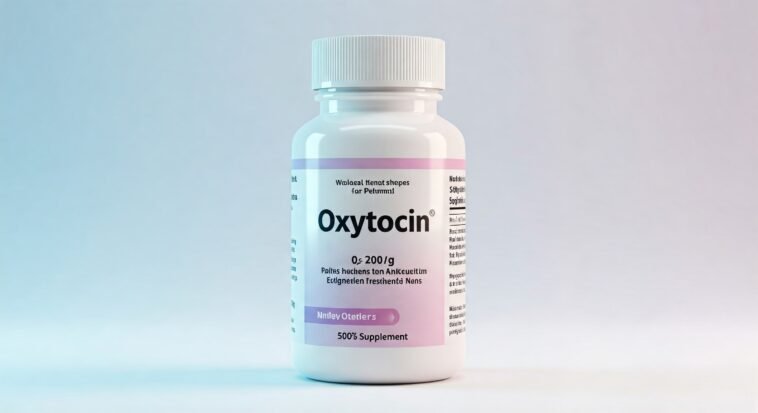
Oxytocin is the brain’s way of saying “awww.”
It kicks in during hugs, bonding moments, and romantic stuff—it’s basically your body’s built-in connection booster.
That’s why people call it the “love hormone.”
Now, companies are selling oxytocin as sprays or pills, claiming it can make you happier, less anxious, and more lovable—kind of like emotional Wi-Fi in a bottle.
But science says: hold up.
The truth is more complicated, and the effects aren’t as magical as the ads make them sound.
In this guide, we’ll unpack what oxytocin really does, whether supplements actually help, and what science-backed alternatives are out there.
Spoiler: some of the best mood boosters don’t come in a bottle—they come from your lifestyle.
Do Oxytocin Supplements Actually Work?
Let’s break it down—can you really spray or swallow your way to stronger hugs, better vibes, and instant trust falls? Here’s what the science says:
Nasal sprays: Some science, not magic
When it comes to oxytocin, nose spray is the main way researchers test it.
Why? Because it skips the whole digestive system and goes straight toward your brain—kind of like using the express lane at Target.
In lab settings (with strict conditions and fancy lab coats), studies show nasal oxytocin might help with:
- Better eye contact and social cues in people with autism
- Lower anxiety in some folks with social anxiety
- Short-term boosts in trust (like you might actually believe your group project partner will do their part)
But hold up—this isn’t some love potion. The effects don’t last long, they vary a lot, and they depend on things like:
- How much you use
- How often
- Whether you’re male or female
- Your unique brain chemistry
The bottom line? Nasal oxytocin can sometimes help in very specific situations—but it’s no instant confidence spray.
And most store-bought versions? Not even close to the stuff used in real science labs.
Oxytocin pills? Basically useless
Here’s the deal: oxytocin is a protein.
If you take it as a pill, your stomach breaks it down—just like it would a slice of pizza.
So it never reaches your brain.
Translation: Those oxytocin pills and sprays you see online are mostly hype. No solid studies back them up. If they worked, we’d all be living in a Hallmark movie by now.

Risks and Side Effects of Oxytocin Supplements
So, oxytocin sounds pretty dreamy, right?
The “feel-good” hormone that’s all about love, bonding, and good vibes.
But before you grab that spray or pill, let’s get real—it’s not all sunshine and rainbows.
Oxytocin is a powerful chemical, and like all superheroes, it has its flaws.
Possible upsides:
- Anxiety relief: It might chill you out a bit (kind of like a spa day for your brain).
- Better social vibes: You might feel more sociable and ready to mingle (just don’t overdo it and start hugging random strangers).
- Bonding boost: Makes you feel closer to people—great for those “let’s be besties forever” moments.
Possible downsides:
- Headaches: Oof, not the best side effect when you’re just trying to vibe.
- Nausea: Feeling queasy while trying to feel zen? Not ideal.
- Nasal irritation (for sprays): Your nose might get a little upset. Not fun.
- Overdependence: You could start relying on it to feel comfortable in social situations (so no more “I don’t need people” vibes).
- Aggression or bias: Yep, oxytocin can actually make you more aggressive toward people who aren’t in your “tribe”.
- Hormonal imbalances: If you use it too often, you might mess with your hormones. Think of it as trying to hack the system—and the system might not like that.
The idea that oxytocin is always the ‘moral molecule’ is a myth. It can just as easily enhance envy, bias, or exclusion. — Dr. Carsten De Dreu, Psychologist and Researcher
Who Might Be Considering Oxytocin Supplements (And Why)
Let’s be honest: life gets lonely sometimes.
And for some folks, the idea of a “bonding booster” in a bottle sounds very tempting—like a shortcut to feeling connected without the awkward small talk.
People who consider oxytocin supplements are usually dealing with stuff like:
- Feeling super lonely (think “main character in a sad indie movie” levels)
- Getting anxious in social settings (like sweating bullets before group presentations)
- Struggling with emotional intimacy (aka, letting people in without freaking out)
- Battling depression or blah moods
- Having relationship stress (cue dramatic breakup scene music)
Sure, oxytocin might sound like a quick fix—kind of like adding glitter to a cracked phone screen.
But mental health pros say: “Hold up.”
Most of these supplements aren’t regulated, and they can’t replace the real emotional work or healthy habits your brain actually needs.

Natural Ways to Boost Oxytocin (Backed by Science)
Good news: you don’t need a magic pill to feel more connected and chill.
Your brain already knows how to make oxytocin—you just have to give it the right signals.
Here are science-backed (and actually fun) ways to boost that “bonding hormone” naturally:
1. Get touchy (the wholesome kind)
Hugs, high-fives, cuddles—physical touch is like your brain’s version of a warm blanket.
- Hug your fam or friends (yes, even if it’s awkward)
- Hold hands with someone you trust
- Pet a dog (or cat, if they’re not plotting world domination)
- Give yourself a mini massage—it actually helps!
Fun fact: A quick hug or a cuddle can boost oxytocin and lower stress. Like a free emotional spa.
2. Actually talk to people (not just through memes)
Connecting with others face-to-face (or screen-to-screen) in a meaningful way matters.
- Have a real convo (beyond “wyd”)
- Say thank you to someone who helped you
- Help a friend or volunteer for a cause—it feels good and boosts your brain
Pro tip: A 20-second hug or a 6-second kiss is basically nature’s oxytocin cheat code.
3. Music and singing
Music = vibes = brain chemistry upgrade.
- Sing with friends (car karaoke counts)
- Dance like no one’s watching (bonus points if someone is)
- Play an instrument or join a jam session
Studies show that group music activities make people feel more connected—and yes, your band practice totally counts.
4. Meditation and yoga
You don’t need to become a monk, but slowing down helps your brain reboot.
- Try “loving-kindness” meditation (it’s like sending good vibes to others—and yourself)
- Do yoga that focuses on breathing and stretching (not just handstands for Instagram)
Research shows these practices help your brain release oxytocin and make your mood more zen.
5. Hang out with animals (A+ emotional support)
Your pet isn’t just cute—they’re also a walking oxytocin machine.
- Cuddle your dog or cat (if they let you)
- Play fetch, brush them, or just chill together
Bonus: When you pet them, both of you get a brain boost. It’s like emotional co-op mode.
Supplements That May Support Oxytocin Indirectly
Okay, we’ve covered the don’t count on oxytocin supplements part.
But guess what?
Some other nutrients and compounds might help support the pathways that make oxytocin work its magic.
It’s like upgrading your Wi-Fi signal for better connection—just don’t expect it to work like a magic potion.
What you might consider (with doctor approval, of course):
- Magnesium: This little mineral is key for neurotransmitter regulation. Basically, it helps your brain do its thing without throwing a tantrum.
- Vitamin D: Low vitamin D levels are linked to mood issues, like feeling down in the dumps (not the good kind).
- L-theanine: This amino acid helps you stay calm and could help with social behavior (aka not being a nervous wreck during conversations).
- Probiotics: You heard that right—gut health is now officially your best friend. There’s some cool science linking gut health to oxytocin levels.

When to Seek Professional Help
So, if you’re thinking about trying oxytocin supplements because you’re dealing with things like:
- Social anxiety that’s just not backing down
- Feeling emotionally numb or like you’re floating through life
- Struggling with relationship problems (or just feeling disconnected)
- Depression or feeling isolated (like you’re stuck in your own personal sad montage)
It might be time to talk to a pro—like a therapist, psychiatrist, or your family doctor.
Oxytocin is cool and all, but sometimes there are deeper emotional or brainy issues that need expert care.
Don’t worry, there’s help out there, and it might include things like:
- Cognitive Behavioral Therapy (CBT): A.k.a. learning to rewire those pesky negative thoughts (kind of like fixing your brain’s Wi-Fi settings).
- Group therapy or couples counseling: Getting support from others who get it can be super helpful.
- SSRIs (Selective Serotonin Reuptake Inhibitors): If your doc thinks you need them, these meds can help balance things out in your brain (a.k.a. the serotonin “mood elevator”).
Also, if you’re feeling really off, getting a mental health screening can help rule out things like autism spectrum disorder, PTSD, or generalized anxiety disorder.
These are often linked to oxytocin studies, and spotting them early makes a huge difference.
Conclusion: The Truth About Oxytocin Supplements
Oxytocin is like your brain’s “hug hormone,” but taking a pill to feel more connected?
Yeah, not so much.
Most oxytocin supplements are all hype and don’t actually deliver the goods.
Science says the best way to boost oxytocin is through real-life connections—like hugging, talking with friends, or doing something kind for someone.
So, if you’re feeling disconnected or struggling with emotional stuff, skip the pill and start with people, positive habits, and pro help if needed.
Trust us, it works better than any nasal spray.



